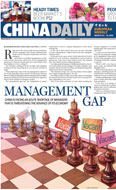Wiping the board clean for China's biz schools
Updated: 2011-03-25 10:29
By Luca Dell'Anese (China Daily European Weekly)
The financial crisis has changed the global business landscape and opened unprecedented opportunities for Chinese companies willing to grow overseas. However, despite the favorable environment, Chinese enterprises are struggling in their effort to establish recognized international brands and become global leaders.
One of the main reasons for this less than irresistible pattern of global expansion lies in the severe shortage of managers and business executives with the international experience to lead the development of Chinese companies abroad.
Managers with the right set of global skills are in short supply and aggressively sought after by Chinese enterprises. Chinese returnees and Western or Asian expatriates provide a partial and temporary solution to this problem, but it is clear that in the long run only a large and qualified pool of managers with the knowledge of the Chinese market and the skills to do business internationally will allow Chinese companies to develop globally.
China needs to foster a new generation of business leaders: After the pioneers of the 1980s and 1990s and the national leaders of this decade, a third generation of transnational business leaders has to emerge to guide the development of Chinese businesses overseas.
The new generation of business leaders must be able to interact and work successfully with people from other countries and cultures, be open to new ways of thinking and ideas and be ready for new challenges and perspectives. They will need to approach business from different cultural perspectives in order to operate successfully in the global arena. They will have to cross cultural borders, be flexible and intellectually curious.
This, in turn, leads to a critical question for business educators: How and to what extent can business schools contribute to teaching and developing this new generation of business leaders?
Business education is growing in China at a breathtaking speed. A discipline that was an unknown quantity 30 years ago has become the most dynamic and innovative branch of Chinese higher education, from undergraduate to graduate education. From MBAs to EMBAs and EDPs, business programs are booming. Business schools have been established all over the country, some of them independent and many others university-affiliated. More recently, leading foreign business schools have begun to operate in China. They have opened independent campuses on the mainland as well as establishing dual degrees or programs with Chinese universities.
This development has not occurred without serious issues and shortcomings: The quality of many programs is questionable and there is a serious shortage of PhDs to fill teaching positions available. In addition, the disparity between the salaries offered internationally and those paid to academics in China is a serious impediment to the ability of local business schools to attract international talents. Innovation is often curbed by government restrictions, requirements and outdated university policies.
Notwithstanding these shortcomings, business education in China has a number of advantages. It will increasingly close the gap with institutions in developed countries thanks to the opportunities offered by a growing and dynamic economy, the interest by a large number of international students and by international scholars to do research in China and a willingness by international academic institutions to share their resources and expertise with local universities in exchange for greater access to the pool of potential local business students.
But Chinese business schools will be able to succeed in developing global business leaders only if they will become global institutions in form and mindset, able to embrace internationalization and adapt it to the Chinese education system.
This will require, for instance, more courses and programs delivered in English, a larger presence of international students on campuses and a real push to create a common learning environment for Chinese and international students so that both can be enriched by the interaction of different cultural perspectives and business approaches. Business schools should also strive to recruit a diverse faculty, formed by both Chinese and international scholars, able to offer different cultural perspectives and solutions to common issues.
This effort will also require a more active learning environment for Chinese students, a shift from a lecture-based teaching approach to a more dynamic and interactive one, focused on developing leadership and communication skills and fostering the students' ability to advocate a point of view and work on independent projects. Business schools will have to nurture the skills of their students to work in groups to achieve common goals.
A lesson from the financial crisis is that the over-reliance on abstract business models can induce hubris and deafness to the complexity of social dynamics. Business schools should emphasize in their curriculum the relevance of ethical and social responsibilities and explore the interactions between business practices and public policies. Schools should also encourage an interdisciplinary teaching approach able to provide students with the ability to address business issues through a prism of different perspectives. Dual degrees (business and law or business and public administration, for example), which is still relatively uncommon in China, could help to stir business education in this direction. Curricula should be constantly updated to reflect the latest developments in business practices, with a peculiar attention, however, to how such practices are implemented in the context of emerging economies.
Chinese business schools are growing by experimenting, innovating and adapting to a constantly changing environment. They should be encouraged to be innovative and daring. Their growth and development will greatly benefit higher education, China and the world.
The author is the associate dean of the International Business School at Beijing Foreign Studies University.
E-paper

Rise and shine
The Chinese solar energy industry is heating up following recent setbacks in the nuclear sector
Bombs aim for regime change
CSI, with a twist
Literary path
Specials

Peony express
Growers of china's unofficial national flower are reaching out to europe for help

Tea-ing up
More turning to Chinese tea for investment opportunities like vintage wine

A cut above
The ancient city of Luoyang is home to a treasure trove of cultural wonders.
